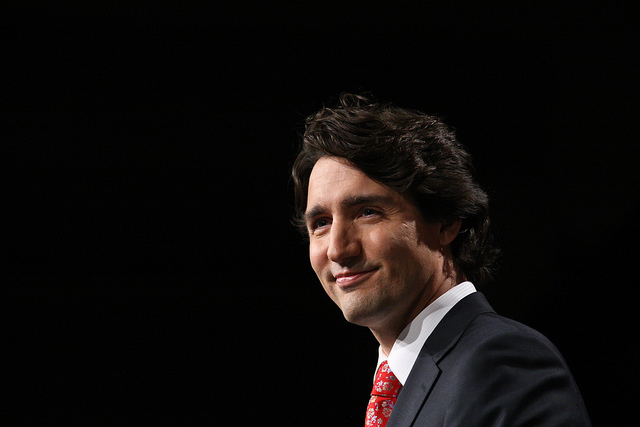rabble is expanding our Parliamentary Bureau and we need your help! Support us on Patreon today!
To say that Justin Trudeau is merely Stephen Harper lite, that the new prime minister is doing nothing more than putting a human face on the old one’s policies is not only unfair, it is wrong in fact.
In many ways, even at this early date, we can see that Trudeau’s is a very different sort of government from the one we had from 2006 to 2015.
The new Liberal government shows every indication of being open to science and evidence; it is taking a welcoming approach toward refugees and family class immigrants; it is serious about the rights of Indigenous Canadians and about recognizing the many wrongs Canada has committed against them; and it believes that not only is climate change real it is a present danger.
On the basis of the evidence so far we are seeing a huge sea change from the Harper regime.
Those who flocked to the Trudeau bandwagon late in the recent campaign have a right to believe there were justified in their choice.
The impulse to shield the new, young PM from even the slightest negative word
That hardly means, however, that the new government is beyond criticism.
And as much as there are some who want to oversimplify things by saying that Trudeau is Harper with a smile, there are too many others who will brook absolutely not a single critical word about the new government.
Their unspoken attitude seems to be: Don’t rock the boat. If you dare naysay anything Trudeau does or fails to do we may, magically, get Harper back again.
It appears that a lot of Canadians feel an almost parental need to shelter and protect the new, young prime minister, with all of his sunny ways. They seem to believe that he and his government are somehow fragile and vulnerable, and might melt in the face of even the most limited and measured criticism.
This writer experienced that over-the-top need to protect when he had the temerity to say that the single legislative measure the Trudeau government passed during the House’s one-week sitting in December was not really the middle class tax cut it was advertised to be.
People with taxable incomes between $45,000 and $89,000 will indeed get a tax cut, but the biggest cut will go to those whose taxable incomes fall between $89,000 and $200,000. Trudeau’s much-touted upper income tax rate increase only kicks in at taxable incomes over $200,000.
Many Trudeau protectors who commented on that story, on rabble and on social media, were outraged that anyone could have the temerity to in any way gainsay the new prime minister and his shiny new, “it’s 2015” team of ministers.
In fact, many flat out refused to believe the tax story was true.
As one commenter put it: “Let’s wait for the fine print. Surely the Liberals will, in time, work this out and avoid what looks like the unintended consequence of giving a generous tax break to a lot of rather comfortable and well-rewarded folks.”
This writer had to respond by saying: “sorry, but we have already seen the fine print. The new tax measures, as described in this space, are now law. They came into effect in the New Year.”
Others might accept that what happened did indeed happen, but they add that Trudeau and company’s high marks for having the guts to raise upper income taxes mitigate their error on the tax giveaway to the $90,000 to $200,000 income bracket.
Most of the tax cut’s billions goes to high-income Canadians
A number of respected economists, including some who generally support the new Trudeau team, have suggested that the largest part of the multi-billion dollar middle class tax cut will not go to those in the target group – middle-income Canadians with total taxable incomes between $45,000 and $89,000 — but to upper-income Canadians, in the $89,000 to $200,000 bracket.
More than one has told Trudeau’s ministers that the government is effectively spending billions of tax dollars in a way that will both increase inequality and have little, if any, helpful economic benefit.
And some of those economists have suggested alternatives, such as transforming the rate cut into a tax credit aimed only at the target, middle class group.
The Liberals had that sound advice well before the House met last December, but they chose not to act on it.
The plain fact is that this new tax measure appears to be a blunder, the result of policy written on the back of an envelope during an election campaign.
The Liberals had not thoroughly thought through the full consequences of what they were promising; but, once in power, they felt obliged to live up to their pledge word-for-word, unintended consequences and all.
None of this takes away from the positive moves the Trudeau government has made on many other fronts, such as restoring the long form census or starting a process that will lead to electoral reform.
But governing is about choices.
And with their signature fiscal initiative the Liberals have made a perverse choice, a choice quite out of keeping with the spirit of what they promised.
This government has a big majority and it is riding high in public esteem. One would think it would be resilient enough enough to handle this kind of constructive and fact-based criticism.
And those who honestly criticize, when criticize they must, are not trying to injure a fragile rookie team in need of coddling and protection. They are just trying to lay out the facts.
Photo: flickr/ Justin Trudeau



